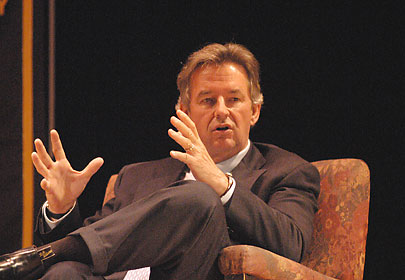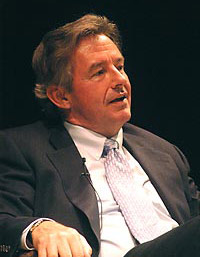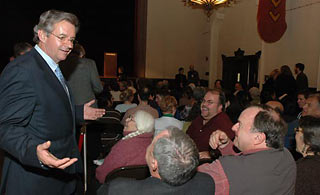Berkeleyan
 |
Former Ambassador Joseph Wilson discusses his mission to Niger and its repercussions at International House. (Photos by Peg Skorpinski) |
Joe Wilson, the man the White House loves to hate, on spies, Scooter, and citizenship
| 14 November 2005
BERKELEY — Depicting himself as merely a citizen doing his civic duty — his undeniable star power notwithstanding — retired U.S. diplomat Joseph Wilson told a campus crowd last Wednesday that he'd expected the White House to retaliate against him for publicly debunking its pre-war claims that Iraq had sought to buy uranium from Niger. The surprise, he said, was that top administration officials would reveal the identity of his deep-undercover wife, CIA agent Valerie Plame Wilson.
"I was ready for these guys to come at me," said Wilson, whose July 2003 opinion piece in the New York Times punched a gaping hole in President Bush's justification for invading Iraq. "But I never believed that they would be so foolish as to compromise the identity of one of their own, somebody who every day came to work to ensure that weapons of mass destruction would not explode in an American city."
 'I believed then — and I believe now — that a citizen has a civic duty to hold his government to account in a democracy for what this government says and does in the name of the American people.' -Joseph Wilson |
Barely a week after the Times ran Wilson's account of his CIA-sponsored fact-finding trip to Niger, conservative columnist Robert Novak disclosed that Wilson's wife was a CIA specialist in weapons of mass destruction, citing "two senior administration officials" as his sources. That leak to Novak and other reporters of classified information — Time magazine's Matt Cooper also wrote about what he'd learned, while the Times' Judith Miller did not — triggered a 22-month investigation by special prosecutor Patrick Fitzgerald, who last month indicted Lewis "Scooter" Libby, Dick Cheney's now-resigned chief of staff, on five counts of obstruction of justice, perjury, and making false statements. Miller went to jail for 85 days to protect Libby, whom she eventually identified as her source. Cooper has said he was tipped off by longtime Bush adviser Karl Rove, who remains under investigation.
"The office of the vice president was obsessed with me," Wilson said Wednesday. "Scooter Libby was running around the White House saying Joe Wilson's an asshole. I think they were pretty paranoid."
The leaks, he asserted, were part of "a concerted campaign" by the Bush administration to deflect attention from the U.S. military's inability to find weapons of mass destruction in Iraq, and from growing suspicions that the White House had twisted intelligence to mislead the nation into war. He called Libby's indictment "a sad day for the country," but added that it vindicated his faith in America's commitment to the rule of law.
Wilson, whose distinguished diplomatic career included stints as U.S. ambassador to Niger and acting ambassador to Iraq, traveled to Niger in 2002 at the behest of the CIA, which was looking into White House claims — included in President Bush's State of the Union address — that Saddam Hussein had attempted to buy so-called yellowcake uranium from Niger for the purpose of advancing his nuclear weapons program. That "fact" was central to the Bush administration's insistence that Iraq might soon possess a nuclear arsenal, and thus posed an imminent threat not just to its Middle Eastern neighbors but to the United States. Wilson, however, concluded there had been no such attempt.
Soon after he went public with his findings, Plame's identity was revealed, effectively ending her undercover career and — according to Wilson and others, including some of her colleagues — potentially jeopardizing the identities of operatives with whom she had worked both here and abroad.
That, Wilson suggested, explains why George H.W. Bush, a former CIA director, wrote him a "long handwritten note about how distressed he felt" over the outing of Wilson's wife. Wilson quoted the first President Bush as having said on several occasions that "those who would betray the sources of our intelligence are the most insidious of traitors," then added: "If it's good enough for George Bush it's good enough for me. I'm not his rebellious son."
 Taking significant time to talk to the crowd who came out to hear him at the International House, former Ambassador Joseph Wilson relished the interaction with the public. |
A California native and surfing aficionado, Wilson combines a laid-back demeanor with a taste for risk-taking — part of the job description of a diplomat in small, unstable African nations — and appeared relaxed and in good spirits on the stage of International House, where he spoke with Michael Nacht, dean of the Goldman School of Public Policy. Before the event began, he casually wandered the center aisle, shaking hands with many of the 600 or so in attendance. Those who couldn't find seats or standing room watched on a closed-circuit TV in a nearby room.
Once on stage, Wilson detailed his bona fides as a former "dip," his shorthand for diplomat, with vast experience in Africa as well as Iraq — a counter to suggestions from the Bush administration and its allies that his wife used her influence in the agency to get him the Niger assignment. Yet he insisted he was no hero, saying what he did "was not an act of great political courage," comparable to the leaking of the Vietnam-era Pentagon Papers.
"My name is Joe Wilson, it is not Dan Ellsberg," he said. "I didn't leak 7,000 pages of top-secret documents, " or suffer the sort of moral crisis later described by Ellsberg, a government military analyst whose release of the highly classified reports in 1971 helped turn public opinion against the Vietnam war. "My article was fifteen hundred words long. It was entitled What I Didn't Find in Africa. It betrayed no secrets whatsoever because there were no secrets to betray."
His role in unraveling the White House narrative of the runup to war in Iraq, he insisted, was that of a responsible citizen. "I believed then — and I believe now — that a citizen has a civic duty to hold his government to account in a democracy for what this government says and does in the name of the American people," he declared.
"It's important to remember that any crimes that were committed were not committed against Joe Wilson. They were committed against you, against all Americans. They were committed against the national security of this country," he said, denouncing the Bush White House as "a radical administration that has stolen the banner of the Republican Party, but is imposing upon this country policies that have nothing to do with Republicanism."
Warning that "we're seeing democracy slip from our hands," Wilson exhorted his listeners not to let that happen.
"Our democracy is worth the fight. We should not allow citizens to be driven out of the public square by this abuse of power on the part of elected officials and their allies," Wilson said, adding: "I don't know of any other way to handle school bullies except to stand up to them."
